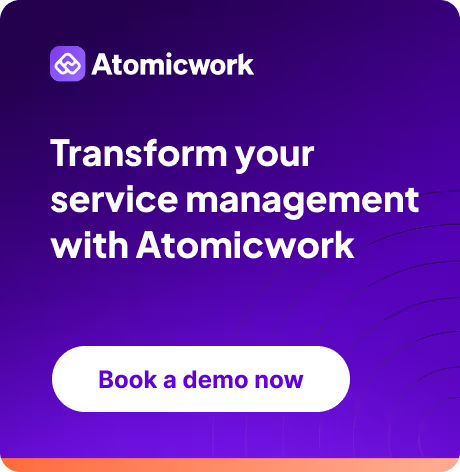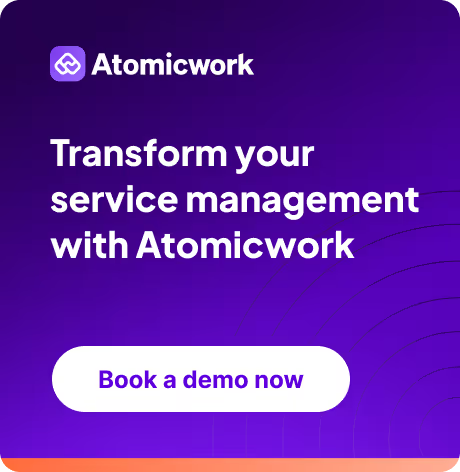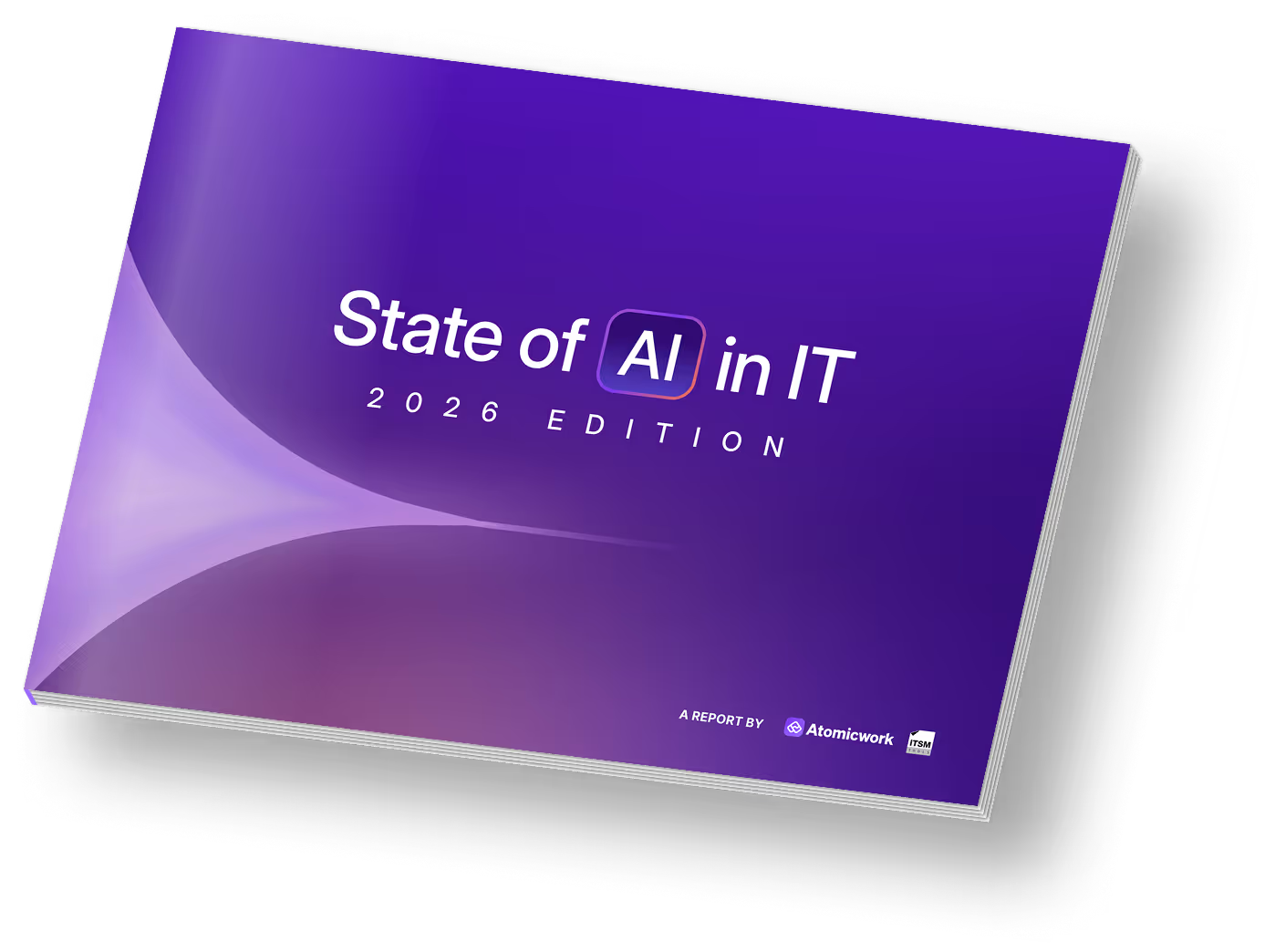Top 25+ AI agent use cases for enterprises

AI agents are refining enterprise workflows by working as a coordinated crew, each specializing in different aspects of business operations. Like a well-structured team, these AI agents collaborate - from understanding employee intents and routing requests to retrieving information and troubleshooting issues. Whether setting up new passwords, requesting time off, or managing software access, these AI agents work together to deliver seamless support experiences.
If you're looking to get started with AI agents for your enterprise, this article will take you through some of the major enterprise AI agent use cases, categorized for different business functions like IT support, HR, finance, sales and marketing, and employee productivity.
For IT support
When an employee raises a request at the IT service desk, multiple AI agents work in tandem: one identifies the intent, another routes it to the right team, and others retrieve relevant information or assist with troubleshooting.

1. Addressing employee knowledge queries
AI agents act as a first-line support system, providing instant answers to common IT questions by leveraging the organization's internal knowledge base. It can access and interpret information from connected sources like SharePoint and Confluence, delivering contextual responses within Teams or Slack. This significantly reduces the load on IT teams while ensuring employees get immediate assistance for routine inquiries about processes, policies, and systems.
For instance, Atomicwork's Atom AI agents use the KnowledgeRetrieval AI agent to fetch precise answers from your organization's knowledge base.

2. Resetting forgotten passwords
AI agents autonomously handle password reset requests across multiple platforms, including Azure AD and Okta. When employees get locked out or need password changes, AI agents like Atom verify their identity and execute the reset without human intervention. This automation eliminates a significant source of routine IT tickets and save operational costs of upto ~85K/year.

3. Access provisioning
Atom AI agents can streamline the access management workflow by automating user provisioning across various enterprise applications. They can handle requests for adding users to Azure AD groups, GitHub repositories, Salesforce, Power BI workspaces, and distribution lists. The AI system manages the approval workflow, executes the access changes once approved, and maintains an audit trail—all while ensuring compliance with security policies.

4. Basic troubleshooting
When employees encounter common technical issues, AI agents like Atom provide step-by-step troubleshooting guidance. They can diagnose and resolve common problems with VPN connections, software applications, and basic hardware by asking clarifying questions to gather comprehensive information. The AI agent leverages its knowledge base to offer contextual solutions and can perform remote actions when integrated with appropriate tools.

5. Service request fulfillment
An AI agent intelligently processes user requests to create properly categorized and prioritized tickets. It extracts relevant conversation information, attaches necessary documentation, and routes requests to appropriate teams.
Deploying Atom AI agents, the Intent AI Agent can identify the request type and suggest the appropriate form. The ServiceRetrieval AI Agent manages service item details, fetching the right service catalog item for the input query while the Routing AI Agent ensures it reaches the correct team.

6. Incident handling
For incidents, AI agents can automatically identify and cluster related issues, notify relevant stakeholders, and initiate response workflows based on severity and type.
In Atomicwork, the IncidentAssist AI Agent identifies similar incidents, alerting workspace agents and auto-linking new incidents to existing clusters. It can also identify similar past incidents to suggest proven solutions.

7. Performing software updates
Through integration with endpoint management tools like Kandji, Atom can handle software deployment and updates. Employees can request software installations directly through chat, and the AI agent manages the entire process - from approval workflows to actual deployment. It can also proactively notify users about required updates and coordinate deployment schedules to minimize disruption.
8. Human agent assistance
When human agents need to handle tickets, AI agents like Atom's AgentAssist provide AI-generated summaries of conversation threads, incident histories, and solutions based on related issues. This helps human agents quickly understand the context and previous actions taken. AI agents can also suggest relevant knowledge base articles and similar past incidents to expedite resolution.
The AgentAssist AI Agent can also suggest next best actions, offer writing assistance, and recommend attribute updates.

9. Automated knowledge base management agents
AI agents revolutionize how IT teams maintain and expand their knowledge bases. The KnowledgeAssist AI Agent continuously analyzes existing knowledge base articles and service tickets to identify information gaps.
When it spots recurring issues without documentation, it automatically suggests and drafts new knowledge base articles. The AI agent creates comprehensive, well-structured documentation that helps IT teams and employees by learning from successful resolutions and common queries. It can also suggest updates to existing articles based on new resolution patterns and emerging issues, keeping documentation fresh and accurate.
10. Asset and resource management
AI agents can also be deployed to manage IT assets throughout their lifecycle. They can track hardware and software assets and automate asset-related workflows. They integrate with tools like Intune and Kandji for hardware assets to enable remote actions such as software installation, updates, and troubleshooting.
11. Personalized workflow builders for different tasks
AI agents enable IT teams to create custom automation workflows for various scenarios. From onboarding new employees to managing access requests, an AI agent can execute complex workflows involving multiple systems and approval steps. These workflows can be customized based on department, role, or other criteria to ensure proper governance.
With Atomicwork, you can also use the AutomationAssist AI Agent to identify workflow gaps and provide automation suggestions based on historical patterns.
12. Providing insights into support analytics
You can deploy AI agents to provide detailed analytics about support operations, including incident trends, resolution times, and service level agreement (SLA) compliance. It can identify recurring issues, measure the effectiveness of automated resolutions, and generate insights to help improve support processes.
The InsightsAssist AI Agent in Atomicwork analyzes helpdesk history to suggest process improvements and make informed decisions about resource allocation.
13. Problem management
AI agents can specialize in analyzing and managing recurring issues across the organization. By leveraging data from incidents and service requests, they identify patterns and root causes and suggest permanent solutions. The AI agent works alongside other IT agents to maintain a comprehensive problem management database, track problem resolution progress, and prevent future incidents through proactive measures.

For HR support
14. Employee onboarding and offboarding
Atom streamlines employee lifecycle management by creating scalable, automated playbooks for onboarding and offboarding processes. Summoning a troop of tools, AI agents can coordinate multiple stakeholders - HR, IT, managers, and team members - orchestrating everything from buddy introductions to document collection.
It automates crucial tasks like provisioning access, setting up equipment, and managing approvals while personalizing each employee's experience. The system ensures consistent execution of all required steps while allowing HR teams to focus on the human aspects of welcoming or transitioning employees.

15. Employee leave management
AI agents can become a central point for managing all leave-related processes, making it easier for employees and HR teams to handle time-off requests efficiently. Through integrations with HRIS systems like Workday, AI agents like Atom can help employees check their leave balances, submit requests, and track approvals - all through conversational interfaces in Slack or Teams. The system automates the entire workflow from initial requests to approval notifications while ensuring compliance with company policies and maintaining accurate records for HR reporting.

16. Employee policy retrieval
AI agents transform how employees access and understand company policies by providing instant, contextual responses to policy-related questions. Instead of searching through multiple documents or waiting for HR responses, employees can simply ask AI agents like Atom about specific policies, benefits, or procedures.
The AI agent leverages the organization's internal knowledge sources to provide accurate, up-to-date information while maintaining consistency in policy interpretation. For complex policy matters, it can seamlessly escalate to HR partners while providing initial guidance to employees.

For Finance support
17. Expense management
AI agents can streamline the entire expense approval workflow through intelligent automation and conversational interfaces. Employees can submit expenses directly through Teams or Slack, with the AI agent guiding them through proper documentation and policy compliance.
The system automatically routes requests through predefined approval flows, validates against expense policies, and integrates with ERP systems for processing. This reduces the back-and-forth between employees and finance teams while ensuring consistent policy enforcement.
18. Retrieve payroll information
AI agents can provide employees with secure, self-service access to payroll information through natural language queries. They can instantly respond to questions about pay stubs, tax withholdings, and direct deposit details using integrations with payroll systems. The system maintains strict access controls while delivering personalized responses, reducing the workload on finance teams for routine payroll inquiries while ensuring data privacy and security.
19. Retrieve insurance policies
Like handling vendor approvals and refunds, AI agents can serve as conversational interfaces for accessing and understanding insurance-related information. Through simple chat interactions, employees can query details about their coverage, dependents, claims processes, and policy updates. The AI agent pulls information from connected HR and benefits systems, providing instant, accurate responses while maintaining confidentiality and directing complex inquiries to appropriate human specialists.
20. Tax filling assistant
AI agents can help employees navigate tax-related processes by providing guided assistance through conversational AI. The system can answer common tax questions, help locate necessary documents, and guide employees through company-specific tax procedures.
For sales and marketing processes
21. Schedule calls
You can streamline the sales team's call scheduling process through a call scheduling AI agent. The AI agent integrates calendar systems and CRM to help sales executives manage customer calls efficiently. It can assist in scheduling, rescheduling, and providing pre-call preparation by pulling relevant account information, open questions, and recent interactions - all accessible directly through Teams or Slack, eliminating the need to juggle multiple applications during customer interactions.
22. Retrieve lead or account information
The AI agents can act as a centralized interface for accessing Salesforce data, allowing sales teams to quickly look at leads, accounts, and opportunities directly from their communication platforms. Business executives can instantly access key information like new lead assignments, account updates, and opportunity status through natural language queries.

23. Update customer relationship management (CRM) software
Like handling pricing approvals and customer inquiries, AI agents can make it easier for sales teams to update CRM records through Slack or Teams. Sales executives can add notes, update opportunity stages, and modify deal information without switching contexts.
For employee productivity
24. Email assistant
AI agents serve as intelligent email management tools that are accessible to help employees compose, review, and manage emails more efficiently by understanding context and integrating with email systems. Through natural language interactions, employees can request email drafts, get notifications, and manage communications without switching between multiple applications, improving the organization's productivity and consistency.
25. Document generation
Atom AI agents streamline document creation by automating the generation of common business documents like employment letters, offer letters, and payslips. The AI agent integrates with HRMS and other enterprise systems to pre-fill forms with accurate employee information, route necessary approvals through Teams or Slack, and deliver completed documents quickly. This automation reduces a multi-day process to minutes, eliminating manual work while maintaining document accuracy and compliance.
26. Calendar assistant
AI agents can help employees manage their schedules efficiently. The AI agent can schedule meetings, send reminders, handle follow-ups, and coordinate with multiple stakeholders - all through natural language commands, without constantly switching between calendar applications.
27. Report generation
AI agents simplify the creation and distribution of business reports by automating data collection and formatting. Through integrations with various enterprise systems, the AI agent can generate customized reports on demand, whether for employee performance, project status, or business metrics.
Conclusion
From helping employees with simple password resets to building complex workflows, AI agents are refining how enterprise teams get work done. Whether you're troubleshooting IT issues, processing leave requests, or prepping for customer calls, there's an AI agent ready to make your workday smoother.
The possibilities are endless as teams discover more ways to leverage AI agents like Atom. The best part? This is just the beginning of what these intelligent assistants can do to transform workplace interactions and eliminate time-consuming tasks.
If you'd like to understand which AI agent use cases to prioritize and start implementing at your organization, reach out to us :)
You may also like...


































